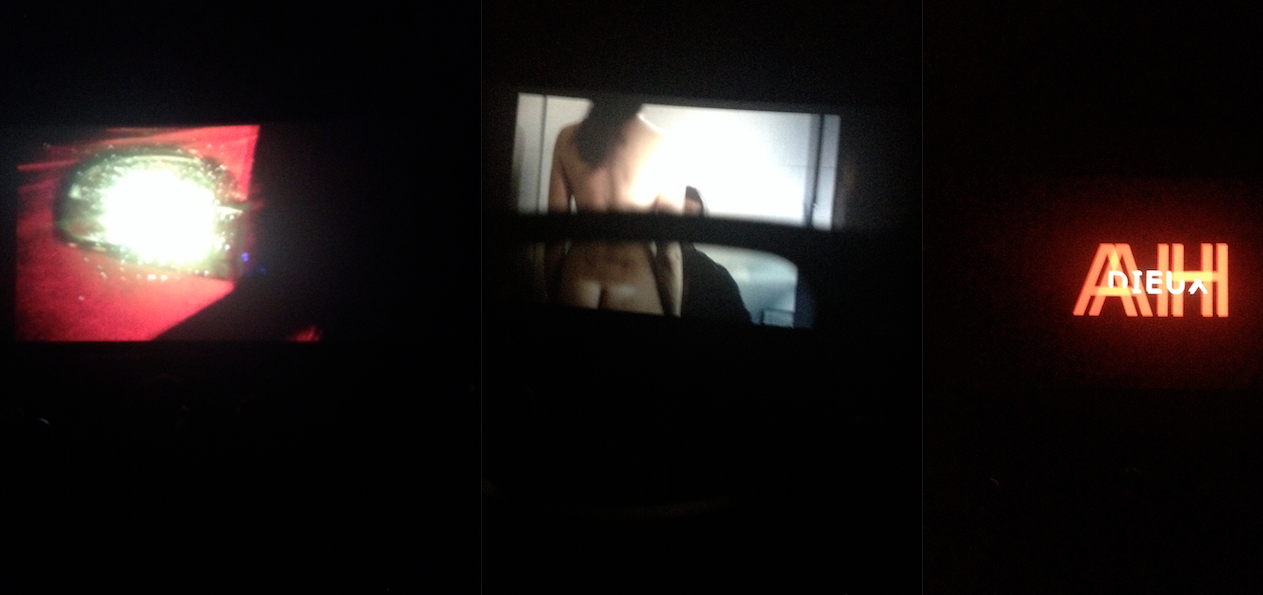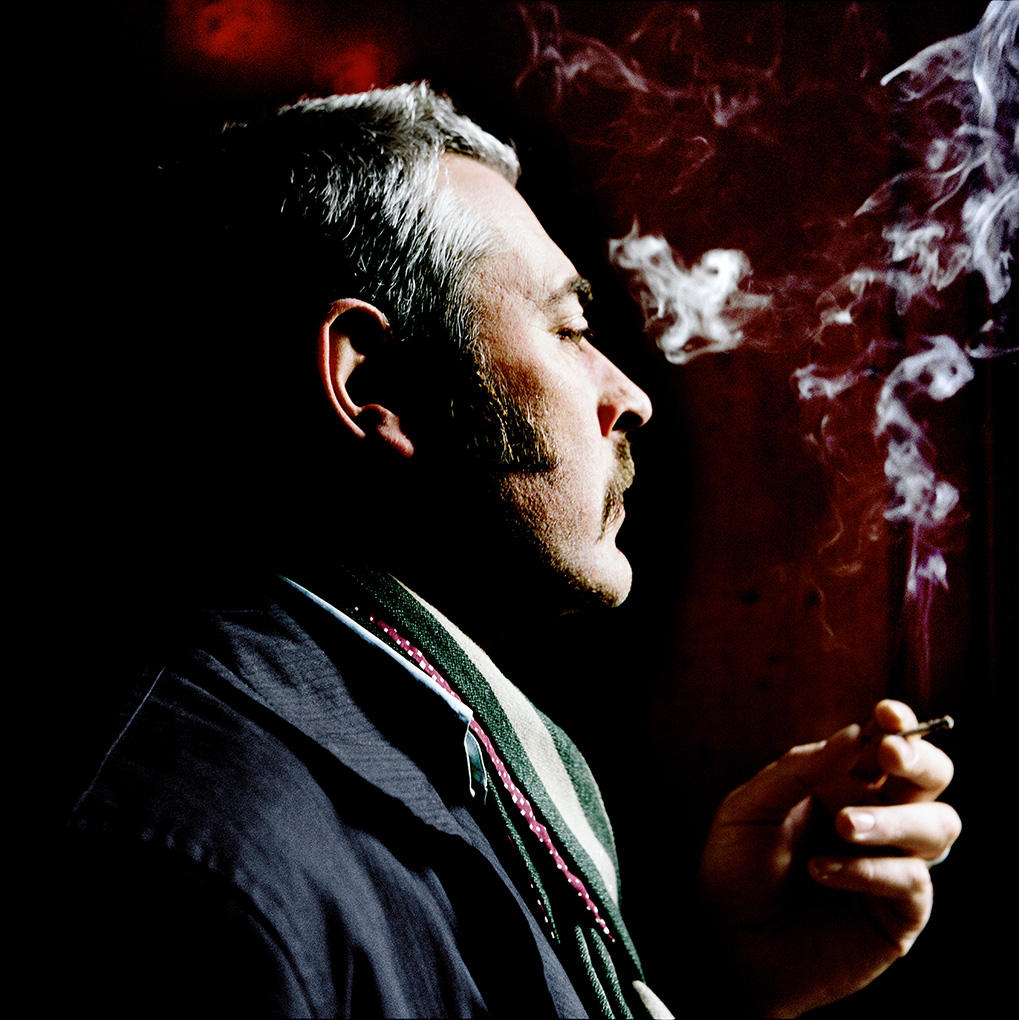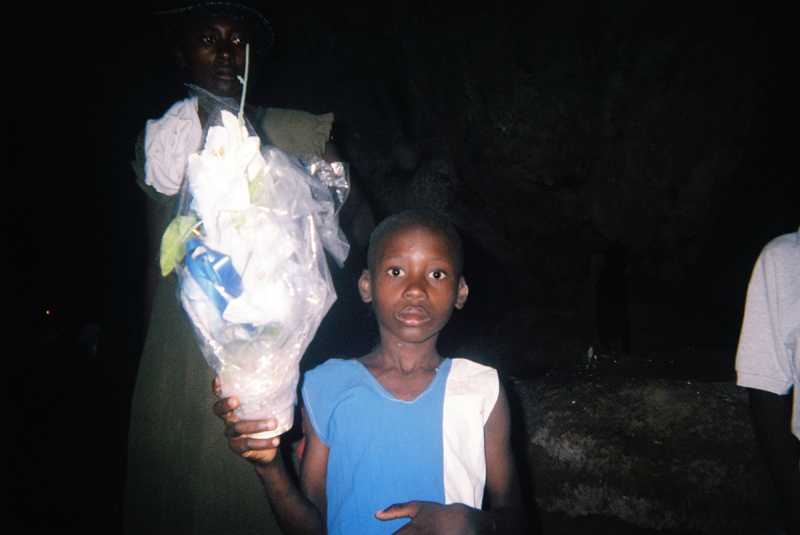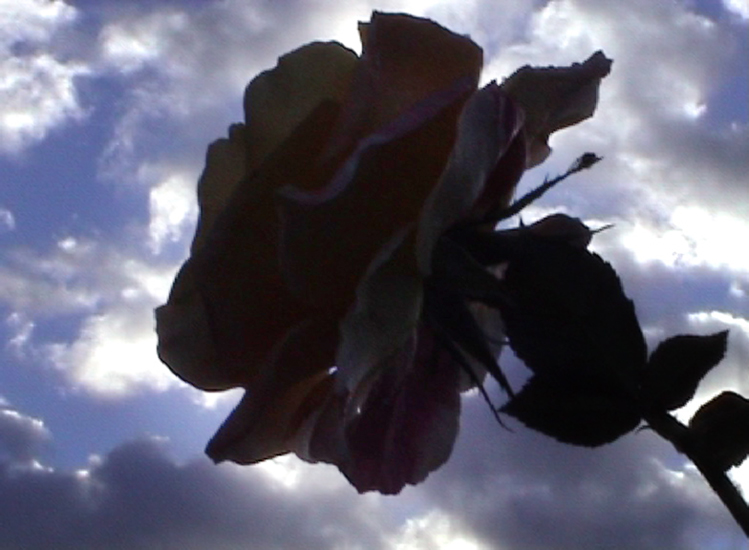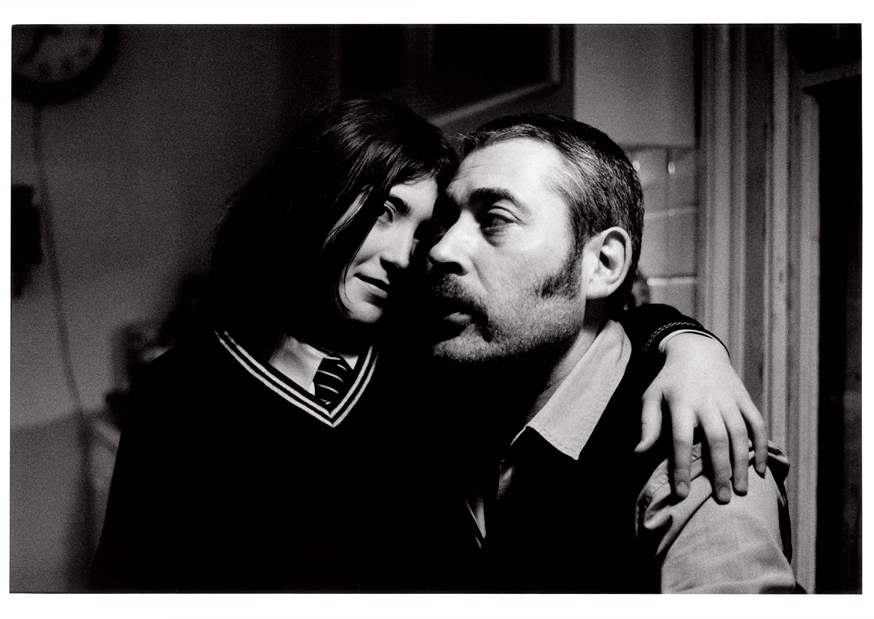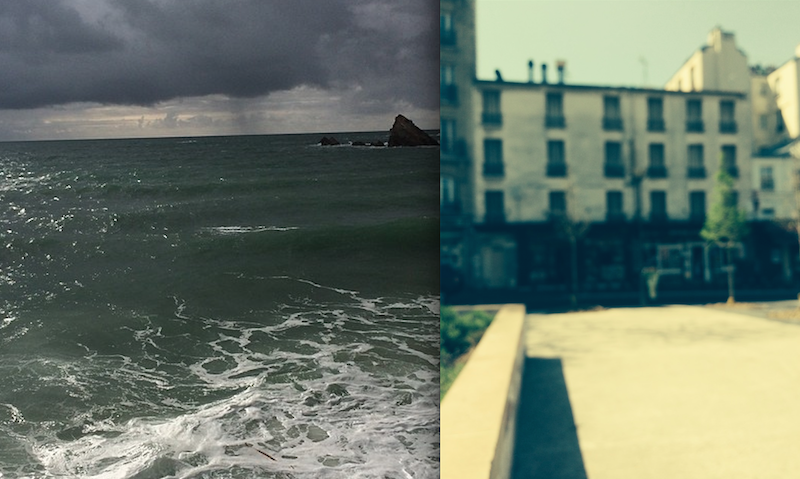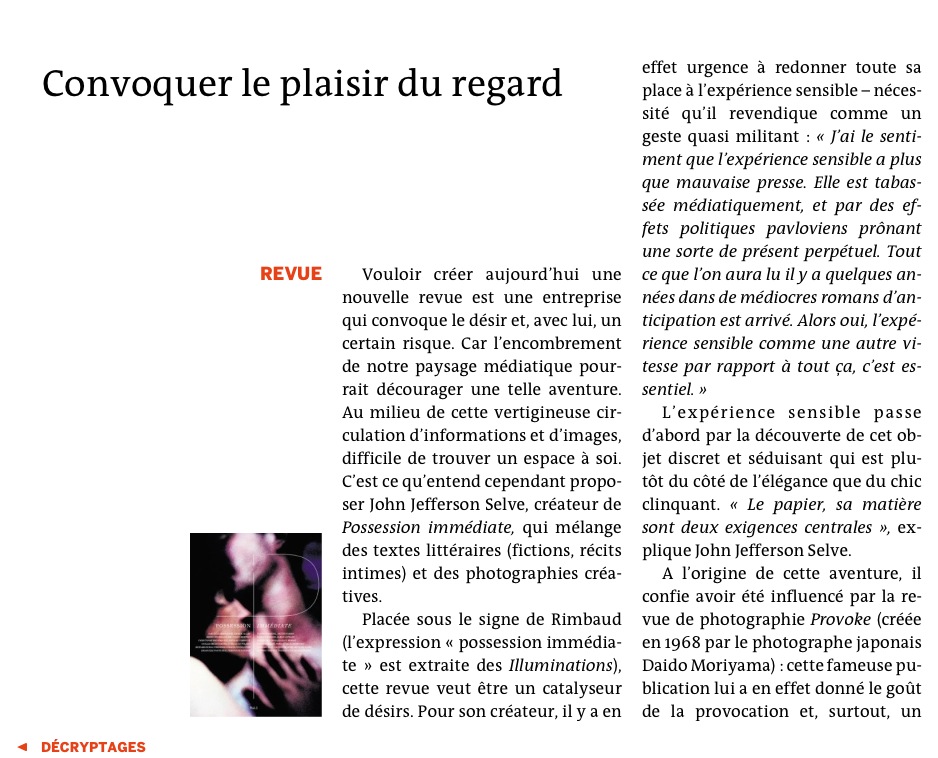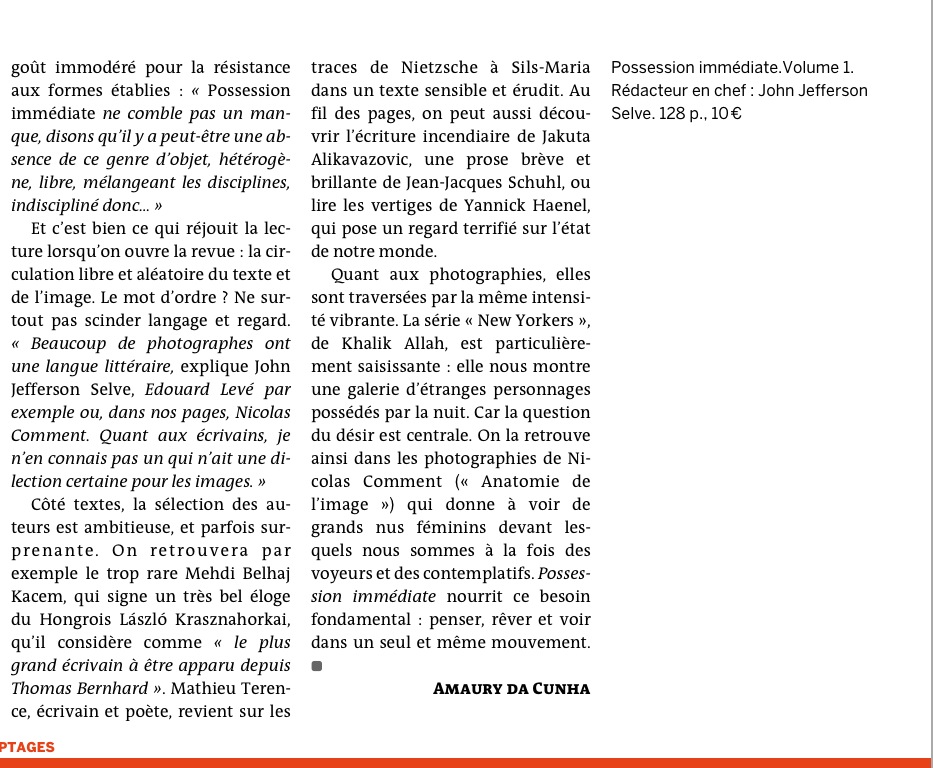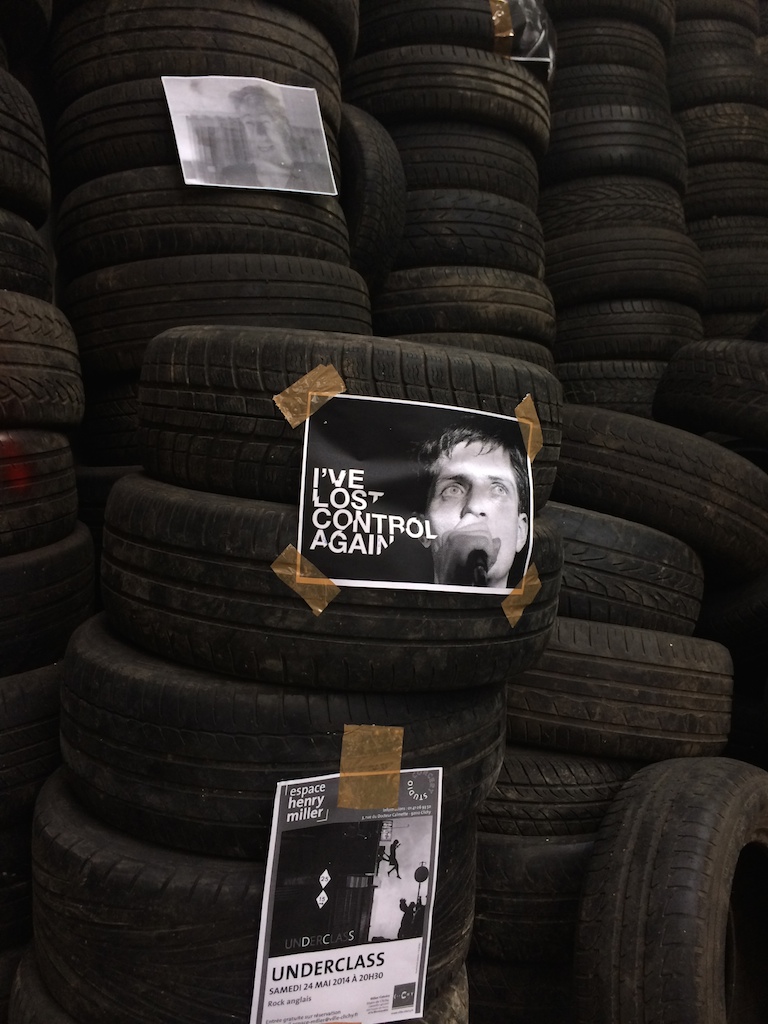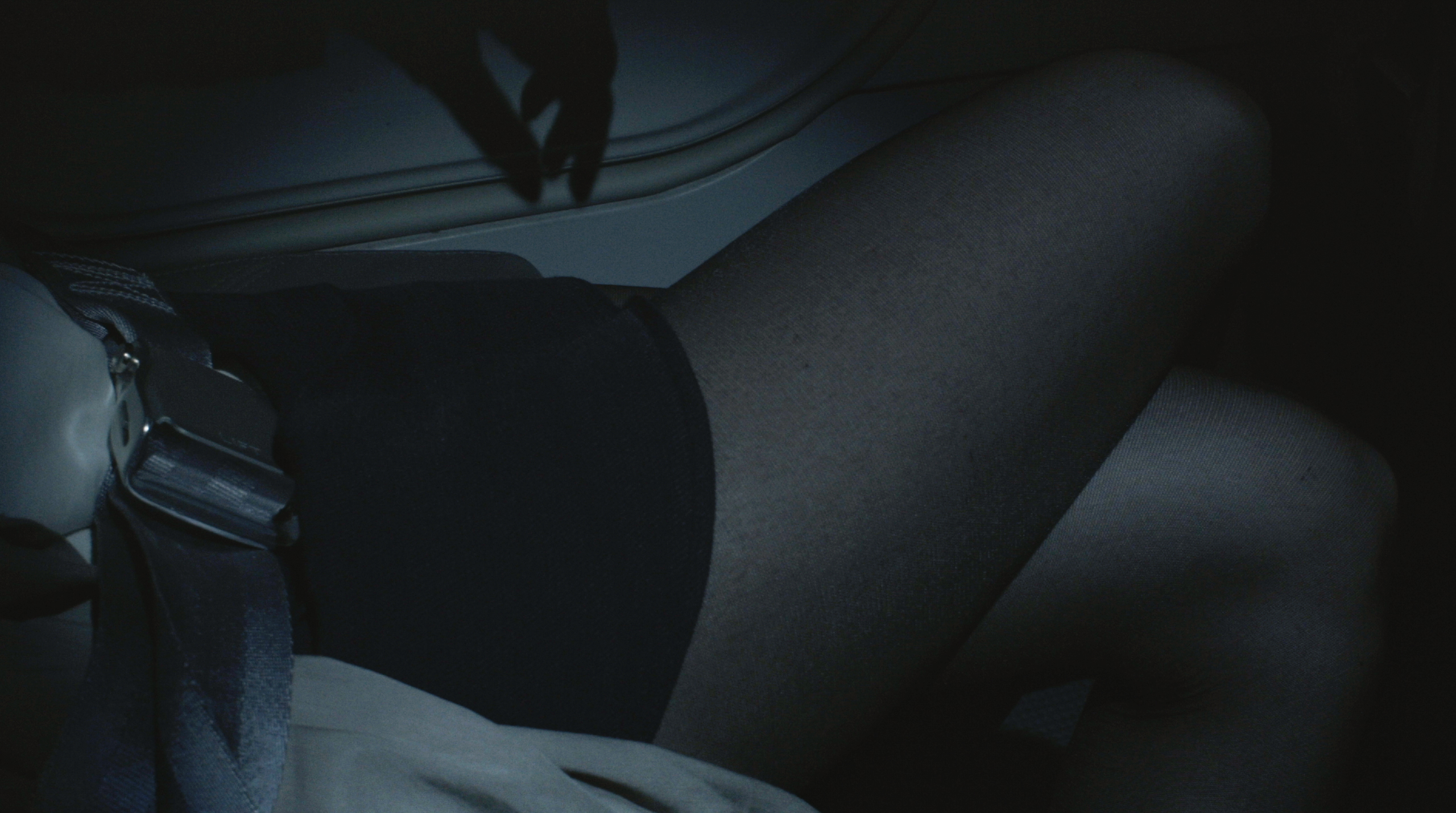projection d’Adieu au langage de Jean-Luc Godard, photographies de Nora Renaud
Non classé
Stuart Staples / Tindersticks – Entretien #3
PART III – AN ACCIDENTAL POET
Interview by John Jefferson Selve & Damien MacDonald
It’s about holding onto naivety really. Like our conversation started.
The power of the band also comes from your magical performances, not many musicians attain such enthralling emotion, I was surprised the first time I saw you in 1994, with the very intense way you inhabited your songs. There was a singular magnetism. For having seen you often at the time, I was (nearly) worried for you, there were so many emotions going through you… Wasn’t it too difficult? It’s very intense I don’t know if it’s hard, or happiness...
I think those days where… Yeah… I was… It’s ok to do a show, and then go home. But when you get like sixty shows… We have never been able to say like take it easy tonight. Everytime we play music, even if it is rehearsal room, everybody goes and there is like no holding back, never about playing. I think we’ve learnt to balance, a feeling of how much we can actually do that basically. We know we can’t do it for a month. We know we can do it for like now 10 days, with places like the olympia around europe. I’m sure it’s going to be great. But at the end of it I think we won’t be burnt out, whereas if it was a month it would be like numbness.
So you found a balance to keep it pleasurable?
Well you know… If you do something, nobody wants to make something in a void. Even making cd’s and people enjoying them, it is still abstract. You still don’t know who you are, with that. Whereas if you stand in front of people, it’s the hardest thing, but to do it and to connect with people, it can make sense of everything you do. It can give you a place in the world. If you don’t do that everything floats, and that is not so good.
So it avoids things from floating, it grounds them in a way?
No, it does. I have a friend and I’ll say to him, listen to this album, I think you’ll like this record, and he’ll listen to it, and he’ll say, yes I like it, but I want to see the whites of there eyes. When you stand in front of someone at a concert, that is when you see… I need to connect with things on a deeper level… Records do one thing, but being a live performance is a different thing.
With the Tindersticks that is positively sure… We also have this question on Claire Denis, I guess you are often questionned on that, but on the last movie Les Salauds. You use a new electronic instrument, it’s strange it’s new for you? It’s very interesting…
When I first talked to Claire about Les Salauds, she talked about the main character being a sailor. And how for a sailor when he is at sea everything is simple, and as soon as he steps on land, everything is complicated. So I kind of wanted to make something that created an alien space around him, even though he is in Paris. And with that came the idea of electronics because for me it is totally alien. So at christmas I was sitting surrounded by equipment that I didn’t know how to use. (laughter) so by March it was from that feeling of dealing with something that is not easy material. It helped create something that has even more of a tension in it. I’m really happy with the soundtrack, but it’s a totally different thing, there’s not even any microphones used in it. Everything is straight (plugged into), there’s no space, there’s no air… Even the guitars are straight into the recording. There is absolutely no air in the music whatsoever.
That was for the mariner, no air, all liquid…
Everyone of Claire’s films, have all asked for something so different.
Trouble everyday could be considered as a Tindersticks album of it’s own, no?
Trouble everyday, was like a gift. Claire is going to make a film about vampires, but the thing she is interested in is why lovers want to bite each other. That’s what she’s interested in. So for us it’s like hey, romance… And it created this kind of sweet violent thing that worked really well, because things like that don’t come along very often when you can find of strength of idea of kind of feeling, to come together in a film.
Talking of visual arts, and photography, could you talk a little abut Richard Dumas?
I saw Richard last night, but when we played our first concert in Rennes, in 1994, at the Ubu, and he walked in backstage with his camera and introduced himself, and took some pictures of us and sent them to us. And one picture is still my favourite band picture we have ever had. It’s in a dressing room, over the years we have just kept on working together. It’s fantastic to work with somebody who, It might sound ridiculous, but, considers a shot, he wont take a picture unless he is convinced. The more time goes on the stranger and stranger that gets. And I have so much admiration in this day and age, when you have this pressure builds up in photographers, so they just have these automatic things, that go tch tch tch tch… done. But I think to have the confidence of one roll of film. He came yesterday, he took a photography of me yesterday, and it took him two shots. And obviously the results speak for themselves.
It maybe relates to the idea of painting, in which image takes time, instead of trying to go faster than the rhythm of the world?
I agree with that as something that is valid. But maybe not as a dogma. Sometimes fast things are great. Fast ideas, reactions, can be really fantastic. Finding the balance, because otherwise when overconsidered, considering everything in some kind of perfection, can become a blander. Keeping an urge in something is essential.
Neil and David ?
Neil David and I were friends, and played music together before the band. I was in my first band with Neil when I was seventeen, so it’s like a long time. And then a few years later I met David. And then it was the start of this band really. And we asked Neil to come around and play around, before the first album. Our relation is bigger than the band, or rather it is the band really. They are both very different. David is a writer, he is driven like me by ideas. His ideas are very different, but he is driven by them. Neil is driven by playing guitar. But I think we all share a restless spirit. We don’t want things to be the same. We all want to put ourselves in situations that are more difficult, or face ourselves with something we are not sure how to do. As three people we have been able to do that. And I think with Dan McKenna joining us, the bass player, who has been playing with us for six years now, he has been such a positive force to release that within us, because brings that with him, he is a musical adventurer, he wants something to happen for the sake of it, that’s what has changed and happened with the band now… The great thing with the something rain, is how much Neil and David where able to surprise me, and I hope I was able to surprise them too, and that is really kind of something after nearly thirty years… With David’s writing , with Goodbye Joe, and Chocolate, and there was another track that was just as good, but that did not find it’s way into the album… And Neil’s new way of approaching the guitar on the album is really special, I think it’s the best work he has ever done. I think we surprised each other, and that is special, I don’t think that is something you can always hang onto. You can’t take that as a given. That’s like clouds crossing across, the sky, everything coming into alinement and everybody going like wow this is great.
What can we wish for you?
I think what I said earlier of surviving on your own terms, wherever that takes you, for anybody who wants to make things, that’s what it takes. I don’t think that’s to be the reward in itself. It’s not as easy as it sounds. If your able to feel something, want it, move forward, even if it’s not in music, survive explore, doing that, is what I would like to wish… It’s so easy to end up defined by other peoples versions of success, and not your own, to define your own, is like a kind of little journey in itself, to make that something tangible, and not to beat myself up about other people’s version of success.
OFF CELLS
Nouveaux territoires
Exposition : Vanishing Twin / Philippe Grandrieux / Serial Galerie
Stuart Staples / Tindersticks – Entretien #2
PART II – CHRYSALID
Interview by John Jefferson Selve & Damien MacDonald
If we go back to 1993 to your First album; it was exceedingly well welcomed: it was the album of the year for the Melody Maker, for John Peel, that First album was a stroke of brilliance, an album nobody expected. It was not too complicated for you ?
At that time it was easy. We had spent ten years trying to impress the music business. By the time we had made the first album we didn’t care anymore. It was like a joke, you know, the media, we did not trust or believe anybody. It was great, people were going like, “your music is really cool”, which after ten years was a good thing. We were able to keep our feeling into our second album. It didn’t affect us, and after the second album it really affected us. It was like sit down, this is the reality of the situation. You are in this band, you do this, we do this, you get paid, go away…
You felt labeled and were suffering of it?
It’s about holding onto naivety really. Like our conversation started.Our sense of freedom came with our naivety. We didn’t have any pressure on our music for the first two albums when we played. We just had freedom. Loosing that freedom became kind of harder. We still did good music, but it became harder to enjoy this thing together. Gradually, I don’t really know how we did it, we found ourselves here. When the original band kind of stopped. There was still something left burning, and I never thought it would grow into this. It’s the biggest surprise of the last twenty years for me. And it started from Neal and David wanting this to happen. And I was like “I don’t know” maybe it’s over, I’ll just keep on writing my songs and… But they pushed it, and from there it’s grown into what it is now, which really surprised me.
You have anticipated our question, could you say more about Neil Fraser (guitar) and David Boulter (keybords) (From the original band of the Tindersticks), could you say a few words about them? Because you describe this as a small light, but it feels very bright to us…
Well now yes, but I think The Hungry saw was sensitive, “Falling down a mountain” was experimental, and now the “something rain” is what it is, you know… What it has taken from the first solo albums, was like year zero, like one guy in a garage with a tape machine, I had to strip everything away just to find out how I felt about it. And from there, ten years, the something rain, we are a band again.
How did the other members of the band live that? Was it like coming out of a chrysalid?
You know, after Waiting for the moon, it was like, I think we all felt, but I said it, that we were not happy, and were not in a good place creatively. So we decided to take a break from it. I did not think that break was going to take three or four years. But when we got a chance to be together again, after a few years, it was obvious, some people wanted to go this way, and others wanted to go that way. When you are working together all the time, everything over-lapses. One thing leads into another and into another… I think it was a good thing to do, to create a blank space for people to look at themselves, and know what they want. Half of the people wanted to go their way, and I was part of those people. I was happy making my solo albums, it’s not like being in the band, bu tbeing in the band, when the band is bad is the worse. Waiting for the moon was not a good time for being in the band, to make music. I don’t think it’s a bad record, it’s just the feeling of it, it was hard work.
You have been living in France for a few years, you have your own studio. Was it a way of feeling even freer, to have no strings attached ?
I had a studio in london were I made the solo albums. But after I did leaving songs, I felt like there was no more energy in that room for me. So had to find a new studio, a place that would be bigger, in which people could come together, and that’s one of the reasons I moved to La Creuse (center of France).
You say there was no more energy in that room. What is the type of energy that feeds your work?
I think it’s about, if you have, you casting ideas into a space. The space has to cope with those. For me , I grew to need more ambiance, I grew to need more space for people to be together, and play music, and capture a moment, and to decide wether that’s any good or not afterwards, rather than to have to predesign things in a way. Part of that freedom is part of that space. We can do anything in that space. It sounds beautiful, it’s got a beautiful sound. It’s not grand or anything, but it’s got “air” to react to. Where as my studio in London was like a shoebox.
I like the idea that music would be like casting ideas into space.
I think if you make anything, if you imagine it, you can’t really turn around and hit a brick wall really… I had some great times in my studio in London, and I was really sad to leave it, but I knew I had to take a step forward.
Usually we associate music with time, and you are speaking of space. What is your relation to visual arts ? Possession Immédiate, is interested in image, photography, the sensations we can convey with these arts, do you have a particular relation to that art form, there are often very beautiful pictures of the band…
I’ve been married to a painter for the last twenty years, and she affects everything I think about. The conversation, especially since we have been living in France in the middle of nowhere, our conversations have become very important, because there are not so many other people to react to. We find a space to talk about things, wether it is her paintings or my music, that is really kind of similar. When I first met her, she would always talk of removing a sense of consciousness between what she is feeling and the end of her paintbrush, and making music is the same, it’s loosing a certain kind of consciousness of the physicality of it, and trying to connect that with a flow. A flow of ideas that your body that works don’t get in the way, I think that’s true of trying to make anything, or, trying to connect with any idea and trying to make it seen and tangible.
Words for me are the things that can fuck things up. You have to pick the words to go around something rather than to describe it.
So if I get you right, the kind of gap between the hand and the eye, would be the similar to the gap between the ear and the voice?
Yeah, I mean, I think so many people would interview us and their first port of call would be to compare to Leonard Cohen, or Nick Cave… And these guys are driven by words, that’s their main thing. Which is really not the case for me. Words for me are the things that can fuck things up. You have to pick the words to go around something rather than to describe it. I write most of my songs singing nonsense, and trying to get the essence of the feeling of the singing, and then to try and find the words that can suit them.
Quite a meaningful nonsense?
No, no, it’s nonsense… Most of the time when I start writing a song if I can connect with the feeling I will sing just rubbish, just to sing, and not be inhibited of thinking about words.
At the same time you refer to other artists in your songs. I’m thinking in particular of 4:48 psychosis by Sarah Kane… And there is a strong relation to songwriting...
Oh, no definitely. I’m just saying it’s a different kind of motivation. One of the things I connected with Sarah Kane was a certain kind of informality and abstraction in her writing, like it’s not narrative, it’s narrative in moments, and overall it builds up a picture, so when you finish, you understand it. And that’s something I really connected with about her work. Rather than: “starting here, reading through” It’s like slaps of paint with different feelings and different intensity, that gradually add up to something you can hold yourself, you know…
So we come back to the question of a picture?
But I think it’s also simply that I’ve never been driven by words or driven by literature. Like wanting to tell stories. It’s not something like I feel is a prime motivation for me. I want to get someone to feel something. I don’t want to tell them this happened and this happened, ain’t that happy or ain’t that sad? I just want them to connect with a feeling, and allow us to connect deeply.
Talking of stories, I remember the album you did for children, the stories you tell in them , it’s like if you changed story lines into story patterns, or…
I had an effect on that record but it was very much driven by David. And I started off kind of helping him do it. And it gradually came to a point where I needed to go ok, you need some… Because he had the ideas, he had worked out the songs that he wanted , that started a conversation, I accepted to help him do it, but when we actually started doing it, it needed to take a step, conversation, how to approach it, who to get involved… So I was more of a producer for that, but I think it’s still the same. I think David is able to work within a narrative. He is a really good writer. For my sister, or chocolate, or something like that… He does something that I never could. I guess that’s one of the factors that made we found a way of working together. Different strengths, you know…
Those two songs bring a very specific touch to the albums… They… To talk of them is not easy… But it is as if the real intimacy that it conveys, makes those songs immediately part of our intimacy… Was that a desire?
If I understand you correctly I think that sort of way of presenting it sonically, a space for… If you going to tell a story like chocolate, and just the nature of speaking, you want it to have a human experience, that quality of a conversation, like leaning in and listening, I think chocolate is a bit like that… And again, for chocolate David demoed so much of that on his own, in Prague, and when he brought it in, I knew it was something special, but I also knew it needed freeing, and there is always an awkward moment with David’s ideas when the band has to appropriate his material… And then he prefers the result, but it’s got to do with that, how you want people to feel. What I was saying about not being driven by words, and connecting that with re-recording “a night in”, When we recorded “a night in” first, I was more excited of being behind a mixing desk than I was about singing. Singing was something I did. But being behind a mixing desk in a proper studio, was the thing I was most exited about.
Was it like a birthday present for the band, twenty years, in Abbey Road?
(laughter) I think there is an element of that. It was nice to have in our diary April Abbey Road… Something to look forward to… It was not like this huge pressure. And once we got in there, I was surprised. I was excepting it to feel nostalgic. And it never did. As soon as we started playing, it felt progressive. Which kind of confused me. I underestimated what we wanted as a group of people. It wasn’t about recording old songs. It was like “this is what I want now”… This is what it means to me now. And you end up with some great recordings like “say goodbye to the city” which is like walking into the control room and going wow, that is something I was not expecting.

